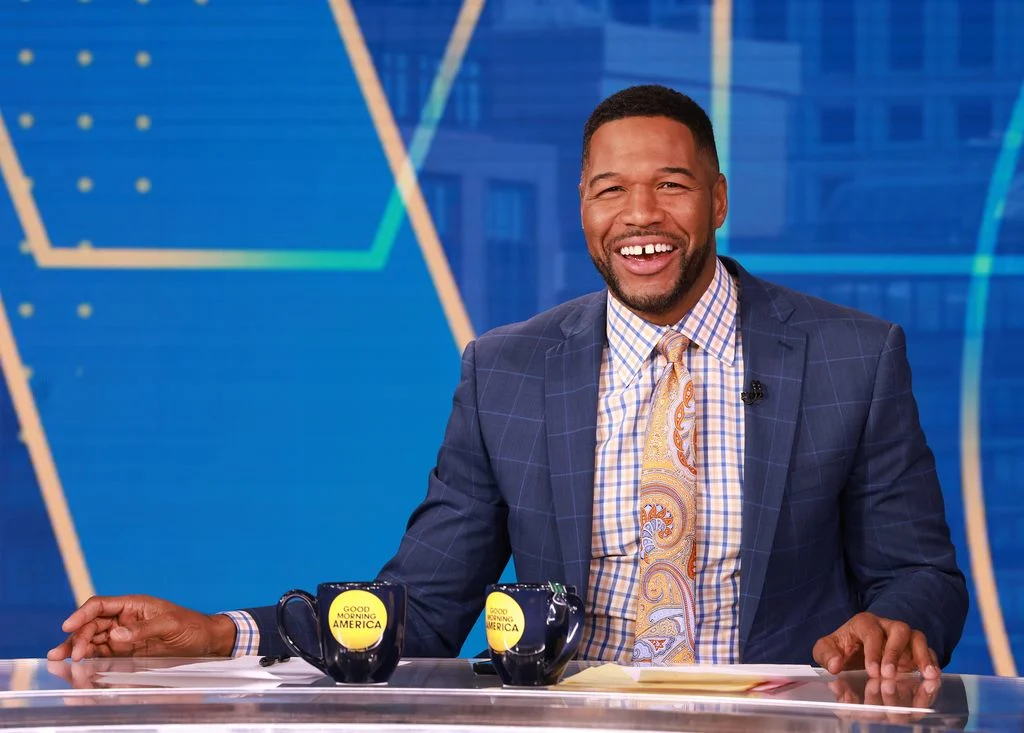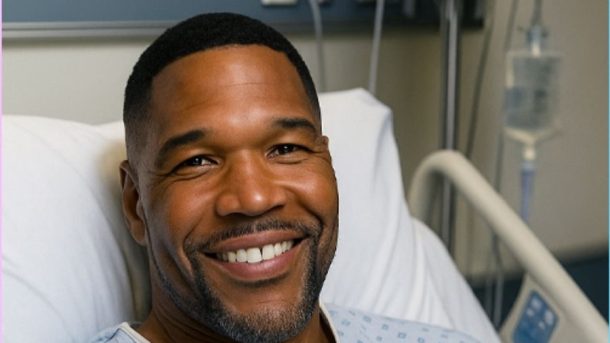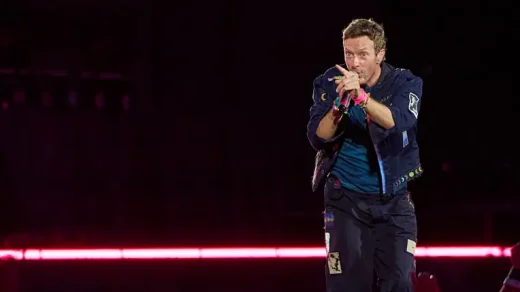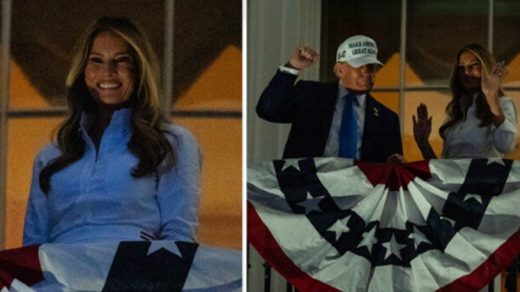For years, Michael Strahan was a symbol of energy, laughter, and unstoppable drive. Every morning he burst onto America’s screens with that unmistakable voice — warm, booming, full of the kind of optimism that people leaned on without even realizing it. He was the man who could flip from a heartfelt interview to a joke in seconds. The man who turned Monday mornings into something people actually looked forward to. The man whose smile felt like a sunrise after a long night.
Which is why, when he suddenly stepped away from Good Morning America, the nation felt the absence immediately. His chair sat empty, brighter lights didn’t distract from it, and even the upbeat theme music couldn’t soften the feeling that something — someone — essential was missing. Viewers sensed it. Colleagues felt it. And America wondered what could possibly keep a man like Strahan off the screen he loved so much.MICHAEL STRAHAN TO BE HONORED WITH FIRST HOLLYWOOD WALK OF FAME SPORTS ENTERTAINMENT STAR – Hollywood Walk of Fame
Weeks slipped by. Rumors swirled. Speculation grew louder. Some guessed exhaustion. Some whispered about stress. Others feared something deeper, more personal, more painful. But in truth, nobody knew. Strahan himself kept quiet, retreating into the one thing he rarely allowed himself: privacy.

The studio lights softened as he walked in. The crew paused what they were doing. Their faces shifted — surprise, worry, relief, all at once — because they could sense that something was different. Not broken. Not defeated. But certainly changed. Michael Strahan stood a little slower, breathed a little deeper, carried himself with a tenderness people weren’t used to seeing in him.
He sat down, placed both hands on the table, and for a moment he didn’t say a word. The silence, unusual for him, told the audience everything they needed to know: his life had taken a turn far more serious than anyone imagined.
And finally — finally — he spoke.
“I needed time,” he said, voice steady but soft. “Time to take care of myself… time to listen to what my body and my heart were trying to tell me.”
It was the beginning of a truth he had been holding close, a truth that had changed the course of his days and reshaped the way he saw everything he once took for granted. For the first time in decades, he stepped off the treadmill of early-morning alarms, nonstop schedules, cross-country shoots, late-night commitments, and the heavy emotional labor of carrying millions of viewers through the hardest headlines of their lives.
He didn’t say he was sick. He didn’t say he wasn’t. What he said was something far more human — something deeper.
“I was running on empty,” he admitted. “And sometimes… sometimes life forces you to stop.”
Behind that confession was a world he hadn’t shown the cameras. Nights staring at the ceiling, wondering how long he could keep going at the speed he was living. Mornings where his chest felt too tight and his breath too shallow. Phone calls from his daughters asking if he was okay. Quiet conversations with people who loved him, urging him to slow down before life slowed him down in ways he didn’t want.
He thought he could push through. He always had. From football fields to television sets, Strahan was the kind of man who ran into challenges instead of away from them. But even the strongest bodies have limits. Even the brightest spirits dim when they carry more weight than they were ever meant to hold.
So he stepped back. Quietly. Without fanfare. Without goodbye speeches or social-media statements. He disappeared into the parts of his life that rarely got airtime — long walks, long silences, long moments with family, long nights sorting through emotions he had tucked away behind cameras and stage lights.
The world kept spinning without him, but his world slowed to a crawl. And in that stillness, after years of running, he confronted the one truth he had spent his life ignoring:
“I have been taking care of everyone… except myself.”
His doctor had warned him months before: stress was no longer something he could simply “manage.” His body was asking for rest. His heart was demanding peace. His life, which had been built on momentum, needed space to breathe. That final push — the one that sent him home to heal — came one morning when he stood in his dressing room and didn’t recognize the man in the mirror. He looked tired in a way makeup couldn’t fix. He looked worn in a way even his smile couldn’t cover.
That was the day everything changed.
Friends gathered around him, some flying in from across the country. His mother called him, voice trembling, telling him she hadn’t heard joy in his tone for months. His daughters hugged him with the kind of fear only children feel when a parent looks more human than they want them to be.
And for the first time, Michael Strahan admitted he needed help.
Not the kind you find in pills or treatment rooms. The kind that comes from rest, reflection, and reaching out. The kind that rebuilds you from the inside. The kind that strips away the public expectations and leaves only the raw, vulnerable truth of who you are when nobody is watching.
As he spoke on air, you could see some of that rebuilding in his eyes — softer, steadier, full of gratitude. He smiled for real, not because he had to, but because he finally understood what mattered.
“I’m still fighting,” he said quietly. “And I’m not giving up.”
The studio went silent. Colleagues blinked back tears. America, watching from living rooms and break rooms and hospital rooms, felt their hearts ache for him.
This wasn’t the athlete who pushed through injuries. This wasn’t the host who powered through exhaustion. This was a man facing himself — and choosing life, choosing healing, choosing to slow down before life forced him to stop again.
He talked about learning to say no. About nights spent reading instead of rehearsing. About mornings where he watched the sunrise for the first time in years. About how his daughters reminded him that the world wouldn’t fall apart if he rested. That joy didn’t always have to be loud. That living didn’t always have to mean doing.
He talked about fear — fear of letting people down, fear of being forgotten, fear of not being the indestructible version of himself the world expected.
And then he talked about hope.
“My story isn’t over,” he said. “Not even close. I’m writing a new chapter — one where I actually show up for myself.”
In the months that followed, the change was visible. He smiled with more authenticity. He moved with more intention. He talked openly about mental well-being, about redefining masculinity, about giving up the superhero myth that kept him locked inside expectations for decades.
Fans embraced him even more fiercely. Messages flooded in — stories from fathers who needed to hear him say it, from mothers who finally prioritized themselves after years of sacrifice, from young men who learned that strength doesn’t mean silence.
Strahan became something different than he had been before — not just a host, not just an athlete, but a reminder. A reminder that even the strongest among us need softness. Even the busiest need rest. Even the most successful need to step away, breathe, and rebuild.
His return wasn’t dramatic. It wasn’t triumphant in the Hollywood sense. It was human. Quietly powerful. Deeply emotional. The kind of comeback that doesn’t need applause to feel significant.
He ended his message with the same line millions now quote:
“This isn’t the end of my story.”
And maybe that’s why America loves Michael Strahan so fiercely. Not because he’s perfect, but because he’s real. Because he’s flawed. Because he’s brave enough to admit when he’s tired and strong enough to come back on his own terms.
A nation watches him fight — not a disease, not a villain, but the overwhelming weight of life itself — and sees their own struggles in his eyes.
And slowly, beautifully, he rises.



